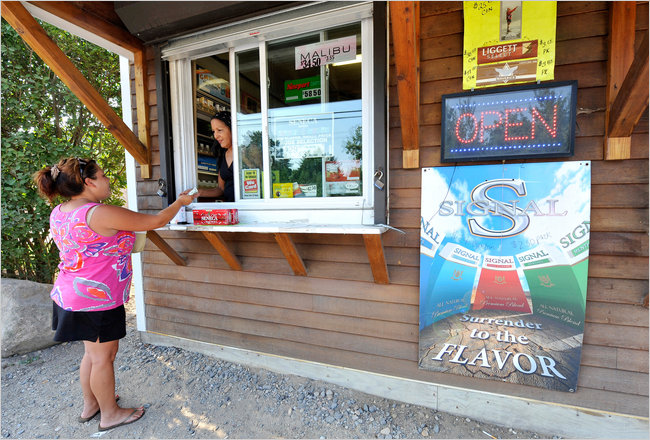September 1, 2010
AL BANY - Just as state tax agents were preparing to act on the Legislature's and Gov. David Paterson's decision to collect taxes from Native American cigarette merchants, a federal court judge in Buffalo on Tuesday gave a reprieve to at least two Indian nations.
BANY - Just as state tax agents were preparing to act on the Legislature's and Gov. David Paterson's decision to collect taxes from Native American cigarette merchants, a federal court judge in Buffalo on Tuesday gave a reprieve to at least two Indian nations.
Ruling in favor of the Seneca and Cayuga tribes, U.S. District Court Judge Richard Arcara temporarily blocked the state from enforcing the law until a hearing to determine if a trial is in order. The hearing on his preliminary injunction is scheduled in two weeks.
The order only applies to the two tribes and not other Indian merchants who are exposed to the law, which takes effect on Wednesday. A spokeswoman for Paterson warned that beginning Wednesday "it will be against the law for licensed stamping agents to sell unstamped cigarettes to any nation or tribe other than the Seneca and Cayuga."
Seneca Nation of Indians President Barry E. Snyder hailed the decision as a landmark victory in the fight to protect sovereign, federal treaty rights. He said the law is an illegal, ill-conceived attempt by the state to use the tribes "as piggy banks to balance the state budget," and vowed the state won't be getting a penny from Seneca tribal enterprises.
The tax is supposed to be enforced indirectly by requiring wholesalers to provide only taxed cigarettes with tax stamps to tribal sellers, passing on the cost to those operators and removing their tax-free advantage over off-reservation stores. The Paterson administration has booked $150 million in this budget year from the new policy, created by an act of the Legislature, and $200 million annually in future years.
"We were looking forward to the implementation date," said Sen. Carl Kruger, D-Brooklyn, chairman of the Senate Finance Committee, a major advocate for taxing Indian cigarette sales to non-Indians. "This throws a monkey wrench in the process. What we're doing is at the rate of $1 million a day we are feeding the legal defense fund of the Native Americans as they move forward with their agenda of claiming sovereignty." He said he is upset that the same nations accept government assistance and benefits such as Medicaid.
Tax Department spokesman Brad Maione said enforcement will still move forward. The department also began steps to allow Indian customers to acquire tax-free cigarettes for the personal consumption, using a coupon system.
The Seneca nation harbors by far the largest cigarette enterprises among the tribes of New York.
"We're deeply disappointed," said James Calvin, president of the New York State Association of Convenience Stores. "We don't see any circumstances that would justify delaying enforcement; all these issues have been argued and reargued ad nauseam."
The Seneca Nation also filed a motion with the Appellate Division of state Supreme Court in Rochester to appeal Monday's ruling by a state court that upheld the enforcement regulations without allowing more time for public comment or complying with other requirements for emergency regulations.
Meanwhile, the St. Regis Mohawk Tribal Council filed a federal lawsuit over the tax policy in the Northern District of New York and a hearing is expected in January. Mohawk Chief Monica Jacobs said the law interferes with self governance and regulation of the tobacco trade.
Many tribal leaders said the tax policy came to bear without time for preparations or negotiation.
"The governor is rushing this without telling us what the implementation will be," said Lancy Gumbs, trustee of the Shinnecock tribe. "This is just a flat-out siege of our economics, an economic genocide."
Joseph Heath, a lawyer for the Onondaga tribe, said its sole government-owned smoke shop will be put out of business if only taxed stamped products are going to be allowed. The Oneida Indian Nation said since it has relocated a native-brand cigarette factory from western New York to its territory, leaving it with plenty of cigarettes to sell. It continues to have talks with state officials on a resolution that would achieve price equality, a spokesman said.
Tim Coulter, executive director of the Indian Law Resource Center, who has worked for decades with New York tribes, said: "The big picture is the law is wrong; it isn't just for one government to tax the activities of another; for instance the federal government doesn't tax the states."
A rally on Seneca territory is planned for Wednesday morning. Pro-tax forces have scheduled a news conference in the Capitol.
Reach James Odato at 454-5083 or jodato@timesunion.com.
Print version of this article:
